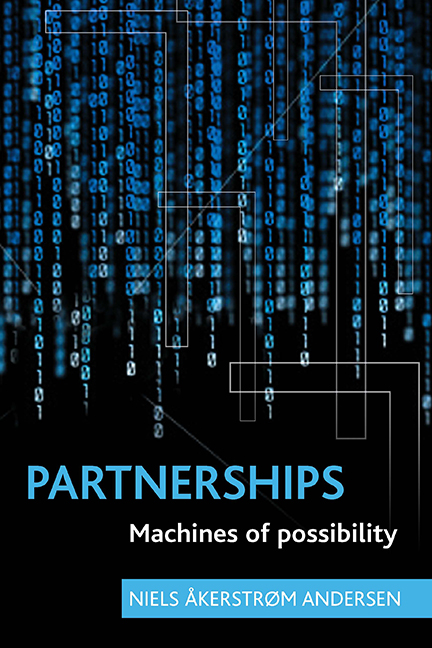Book contents
- Frontmatter
- Contents
- List of tables and figures
- Preface and acknowledgements
- Introduction
- one Analytical strategy
- two Articulating partnerships
- three Outsourcing limits
- four Contracts and relationality
- five Contracts as communication
- six Partnerships as second‑order contracts
- seven Partnerships as tentative structural coupling
- eight Partnerships as second‑order organisations
- Conclusion
- References
- Index
- Frontmatter
- Contents
- List of tables and figures
- Preface and acknowledgements
- Introduction
- one Analytical strategy
- two Articulating partnerships
- three Outsourcing limits
- four Contracts and relationality
- five Contracts as communication
- six Partnerships as second‑order contracts
- seven Partnerships as tentative structural coupling
- eight Partnerships as second‑order organisations
- Conclusion
- References
- Index
Summary
How are partnerships articulated? How specifically do partnerships operate communicatively? How are certain spaces of possibility opened up and put at stake in partnerships?
• How are partnerships articulated as interorganisational relations that cut across sectoral boundaries? This question was about the possibilities for communication that the concept of partnership opens up inside the individual organisational system for discussing and developing expectations of internal organisational issues. The analysis showed how a multiplicity of expectations became condensed into the concept of partnership. These included expectations about the partnership as an alternative to outsourcing, an alternative to sectoral break-ups, an alternative to state, market and civil society respectively, and also a mediator between these. Moreover, expectations were articulated about partnerships as the answer to the current problems of the welfare state and its transformation into a welfare society. Furthermore, partnerships were seen as an adequate way of creating commitment in a complex and changeable society and as a way to open up public markets. In this enormous condensation of expectations into the partnership concept, a contract was defined as the counterconcept that kept the many expectations in place. A contract was everything that partnership was not supposed to be: short term, raw outsourcing, different intentions among contract partners, control-based, conflict-ridden, and so on.
• Then the ISS Catering case was used to show how modern outsourcing of public services to private companies led to communicative clashes between different function systems, particularly clashes between economic communication and political communication, amplified by various mass media games. It was shown how outsourcing creates the potential for conflict without establishing a preparedness or a framework for handling the conflicts. In the case of ISS Catering, it was about the fact that the municipality observed ISS through the political code of govern/governed and therefore perceived ISS as a subjacent administrative unit. ISS in turn perceived the relationship with the municipality through the economic code of have/not have and saw the kitchens as their own with full managerial authority. In the clash between the two differently coded communications, there was no unity of disagreement. The municipality and ISS perceived the clashes in radically different ways.
- Type
- Chapter
- Information
- PartnershipsMachines of Possibility, pp. 137 - 148Publisher: Bristol University PressPrint publication year: 2008



